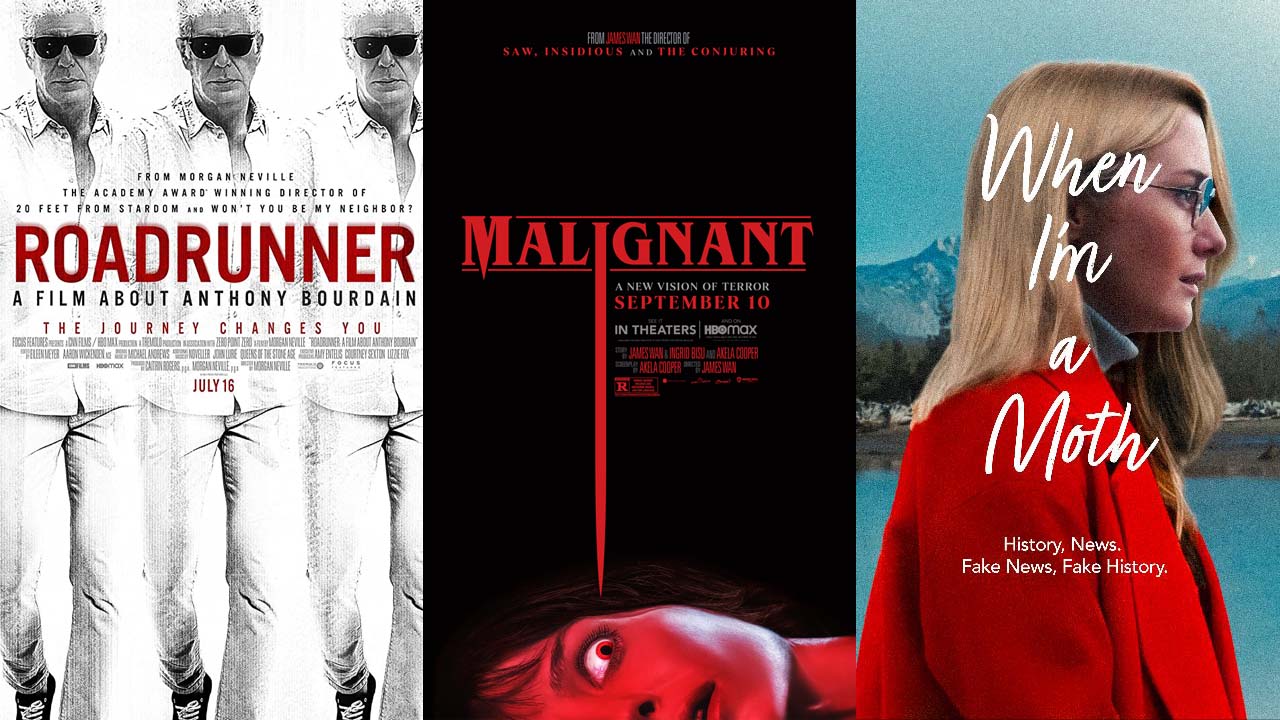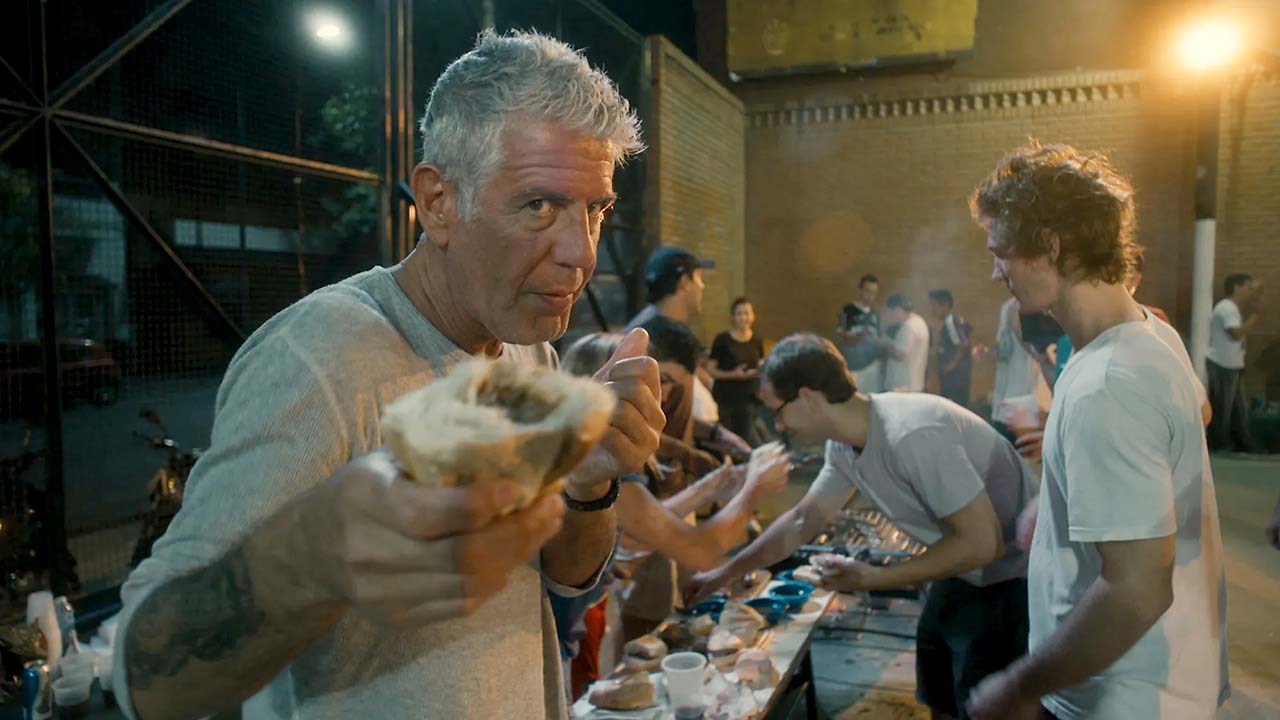Susan Granger At The Movies

Roadrunner: A Film about Anthony Bourdain

Three years after the irreverent, globe-trotting celebrity chef Anthony Bourdain committed suicide at age 61, many are still wondering why. Renown documentarian Melville Norville (“20 Feet from Stardom,” “Won’t You Be My Neighbor?”) tackles this difficult subject in “Roadrunner: A Film about Anthony Bourdain.”
With scathing honesty, Norville vividly depicts a hedonistic, deeply troubled man, chronicling candid, often insightful stories from Bourdain’s chums David Chang, Eric Ripert, Iggy Pop, John Lurie, Josh Homme, Allison Mosshart and others.
After dropping out of college and, admittedly, doing lots of cocaine and heroin, charismatic, chain-smoking Bourdain first found success in 2000, publishing “Kitchen Confidential,” a cynical tell-all about life in the restaurant industry and what really goes on in the kitchens.
A gifted storyteller, he then went on to write other books and host shows for the Food Network, Travel Channel and CNN. On June 18, 2018, the day Bourdain hanged himself, he was in Strasbourg, France filming an episode for “Paris Unknown.”
Admittedly, Norville skims over Bourdain’s early years since his first wife (of 20 years) refused to participate; however, his second wife, Ottavia Busia, with whom he had a daughter, took part.
While those who knew him were stunned, many were not surprised since addictive, sensation-seeking Bourdain was haunted by bouts of depression, often finding himself with no one to talk to, particularly after the abrupt breakup of his passionate romance with #MeToo movement spokesperson Asia Argento.
Years earlier, Bourdain told “Biography”: “I should’ve died in my 20s. I became successful in my 40s. I became a dad in my 50s. I feel like I’ve stolen a car — a really nice car — and I keep looking in the rearview mirror for flashing lights.”
FYI: For a few scenes, Morgan Neville utilizes simulations of Bourdain’s voice using “deepfake technology” to create an eerie A.I. model of his speech, intercutting clips of Bourdain narrations from radio, TV, podcasts and audiobooks.
On the Granger Gauge of 1 to 10, “Roadrunner” is an absorbing, perceptive, empathetic 7, showing in theaters and streaming on Prime Video, Vudu and Fandango.
Malignant

With “Saw,” “Insidious” and the “Conjuring” franchise, James Wan has delivered a steady stream of horror films. Now, teaming with screenwriter Akela Cooper and his wife, actress Ingrid Bisu, he’s concocted a far-fetched yet stylishly schlocky tale called “Malignant.”
Set in Seattle, the plot revolves around a vulnerable young woman, Madison Mitchell (Annabelle Wallis), who has suffered multiple miscarriages and is now pregnant again when her abusive husband, Derek (Jake Abel), beats her, smashing her head against a bedroom wall so severely that the back of her head is bloodied.
He’s then killed by an intruder, and distraught Madison wakes up in a hospital, having lost her baby. Soon after returning to their two-story Victorian home, Madison begins experiencing horrific ‘visions’ of other people being brutally killed by the same unrecognizable intruder wielding a golden dagger.
Comforted by her devoted sister Sydney (Maddie Hasson), confused Madison tries to explain what’s she’s experiencing to a pair of doubting homicide detectives (George Young, Michole Briana White).
Meanwhile, Madison is receiving mysterious psychic messages from a creepy entity calling himself Gabriel, which was the name of her childhood imaginary friend. Shadowy Gabriel’s emergence then unlocks memories of a psychiatric hospital that she’s suppressed for years.
While much of the cringy, campy action borders on the ridiculous, filmmaker James Wan delivers a weird, totally surprising twist, a payoff that’s punctuated by Joseph Bishara’s ominous score.
In publicity blurbs, Wan refers to this as his take on the intriguing subgenre ‘Giallo’ films by Dario Argento, Mario Bava, Lucio Fulci, and Sergio Martino, which were popular in Italy during the 60s and 70s. They always involve a female protagonist who sees a grisly, gruesome murder and is then subject to paranoia and hallucinations.
FYI: The Seattle Underground is a real tour that’s open to the public.
On the Granger Gauge, “Malignant” is a spooky, sinister, supernatural 6, playing in theaters and streaming on HBOMax.
When I’m a Moth

In her memoirs, Hillary Rodham Clinton mentions that, in 1969, just after graduating from Wellesley and before entering Yale Law School, she spent her summer vacation in Valdez, Alaska, working in a fish-packing plant. She observed, “Sliming fish was pretty good preparation for life in Washington.”
Based on that slim factoid, Zachary Cotler and Magdalena Zyzak concocted “When I’m a Moth.” They’d previously co-helmed “The Wall of Mexico” (2019) about rich Mexican-Americans who build a wall to keep out poor white thieves, along with “Maya Dardel” (2017), featuring Lena Olin as a poet who announces on a radio show that she plans to commit suicide.
This story begins with: “What follows is a work of fiction. So is the United States political situation.” If the filmmakers were trying to make a socio/political point, it’s too elusive to decipher.
Instead, they weave a pointless narrative about an idealistic young woman with long, blonde hair whose name is Hillary (Addison Timlin). Early on, she announces, “I’m going to be a politician. I’m on a predetermined path.”
Knowing no one, Hillary befriends two Japanese men who watch her walk home from the cannery each day. Mitsuru (Toshiji Takeshima) is a drunk but Ryohei (T.J. Kayama) pursues the relationship. Perhaps teasing, he says he’s from Nagasaki — to which she seriously replies, “I guess I’ll have to be involved in something like that (one day).”
Soulful Ryohei is smitten, but self-absorbed Hillary prefers to engage in meandering conversations about human nature and her future, murmuring, “You can’t get rid of ignorance. It always seems to triumph … somehow, I feel doomed.”
The title emanates for Hillary’s self-description as “a moth that has to be in a cocoon first” before pursuing what she perceives as her destiny.
While Lyn Moncrief’s cinematography captures Alaska’s snow-capped mountains and spectacular scenery, the concept’s self-conscious pretentiousness is as off-putting as it is tedious.
On the Granger Gauge, “When I’m a Moth” is an oddly frustrating 3, streaming on most digital platforms.
 Susan Granger is a product of Hollywood. Her natural father, S. Sylvan Simon, was a director and producer at M.G.M. and Columbia Pictures. Her adoptive father, Armand Deutsch, produced movies at M.G.M.
Susan Granger is a product of Hollywood. Her natural father, S. Sylvan Simon, was a director and producer at M.G.M. and Columbia Pictures. Her adoptive father, Armand Deutsch, produced movies at M.G.M.
As a child, Susan appeared in movies with Abbott & Costello, Red Skelton, Lucille Ball, Margaret O’Brien, and Lassie. She attended Mills College in California, studying journalism with Pierre Salinger, and graduated from the University of Pennsylvania with highest honors in journalism.
During her adult life, Susan has been on radio and television as an anchorwoman and movie and drama critic, syndicating her reviews and articles around the world, including Video Librarian. She has appeared on American Movie Classics and Turner Classic Movies. In 2017, her book 150 Timeless Movies was published by Hannacroix Creek Books.
Her website is www.susangranger.com. Follow her on Twitter @susangranger.
